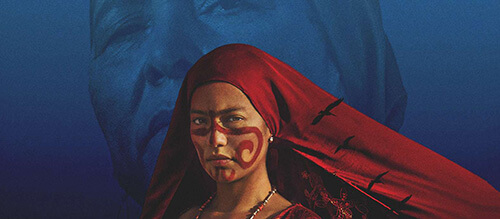Birds of Passage (2018) Review
This article was written exclusively for The Film Magazine by Lucas Hill-Paul.
Birds of Passage (2018)
Directors: Cristina Gallego & Ciro Guerra
Screenwriters: Maria Camila Arias & Jacques Toulemonde Vidal
Starring: Carmiña Martínez, Natalia Reyes, José Acosta, Jhon Narváez
Colombian director Ciro Guerra transposes his nuanced exploration of indigenous tradition so electrically realised in his 2015 film Embrace of the Serpent to his home territory. Teaming with first time feature director and long time collaborator Cristina Gallego, Birds of Passage chronicles in five chapters the rise and fall of a Wayuu family’s illegal drug trade during the late 1960s and 70s.
Borrowing beats and rhythms from familiar crime films, narrative conventions aplenty that feel superficially unremarkable to any fans of The Godfather or Goodfellas, much like Embrace of the Serpent the directing pair effectively splash linguistic and cultural tension throughout their weighty epic. While Embrace took a Heart of Darkness approach to intrusive, naïve colonial visitation to native tribes, Birds of Passage is told completely through the eyes of the Wayuu. Their approach to the drug trade is unavoidably criminal, but the family business is layered with tradition and cultural courtesy.
For the Wayuu, a dead body is far more than collateral damage, and bloodstains are an open invitation for evil. Unlike narco thrillers we’ve seen countless times on Netflix, Gallego and Guerra opt for a near surrealist approach, translating the signs and omens of the culture into textual narrative launching points, and lucid visions that accurately predict an oncoming downfall. The majority of these come from the tribe’s matriarch, Úrsula, who provides a stoic, sturdy balance to her son Rapayet’s unruly dealings with visiting Americans and compulsive business partner, Moises.
Úrsula, alongside her new daughter-in-law Naida, offset a traditionally macho story with a much-needed, yet regrettably fleeting, feminine centre. The duo discuss dreams of Naida’s grandmother amidst a brewing family war, and there’s a continuous implicit vibe that it’s the women who call the shots for the Wayuu. However, the sprawling script is predominantly laced with masculine bravado that doesn’t do much to counter our male characters’ viewpoint of women as not much more than material or maternal.
Rapayet delves into the drug trade initially to provide a vast dowry for Naida after partaking in a traditional dance of courtship, an early highlight in which Natalia Reyes, wrapped totally in deep red silk, all but transforms into a windswept bird in one of the better physical performances of the year. Unfortunately, once Naida settles into her marital position she’s completely under-utilised, speaking perhaps no more than twenty lines for the remaining runtime. It’s unfortunate given Úrsula’s withering, textured presence at the centre of the film’s conflict that Naida’s fate is ultimately disposable.
While the metatextual imagery isn’t quite striking enough to make a searing imprint, the film’s lengthy runtime and heady subject matter does benefit from moments almost reminiscent of Jodorowsky’s Acid Westerns. Some fantastic nature shots, including the particularly ominous recurring image of a heron’s feet striding calmly through quiet bloodshed, offer an effective reminder of human impermanence. It’s in the film’s weirder moments that the feminine grounding is displaying its best strengths, as the vibrant appearances of technicolour birds and locusts become far more than painterly set dressing, offering tranquil moments of reflection whilst the boys go off to play with 4x4s, guns and alcohol.
There are moments in Birds of Passage that feel like you’re watching the Colombian answer to City of God. Indeed, the framing device of the five chapters as well as the bookends of singing narration from a mysterious wise seer, while a little exhausting by the time the narrative reaches the penultimate section, does colour the story with the literary feel of a modern classic. Gripping and momentarily beautiful, the sweeping scale and effective pace ensures that what could have been an overly familiar narcotic morality tale whisks you along, and certain flaws are forgivable when they’re offset against effective insight into a barely represented South American demographic.
19/24
You can support Lucas Hill-Paul at the following links:
Personal Twitter – @lucashpaul
You can find more of his writing at Film Daily News – @FilmDailyNews
[DISPLAY_ULTIMATE_SOCIAL_ICONS]


